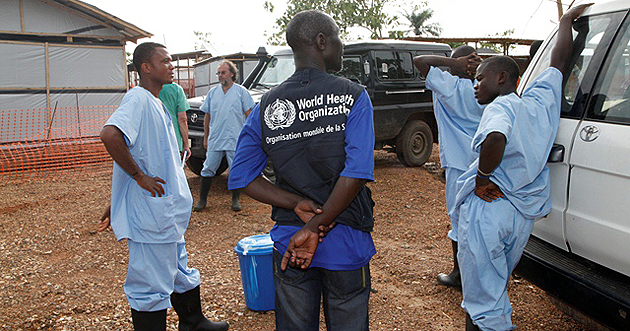The importance of preparedness – everywhere
One year into the Ebola epidemic. January 2015
Although all cities with an international airport are theoretically at risk of an imported case, the need for preparedness is greatest in countries that share borders or have extensive travel and trade relations with the three hardest-hit countries.

CHAPTER 12 - The successful experiences in Senegal, Nigeria, and Mali demonstrated the importance of preparedness and having the capacities in place to mount a rapid and comprehensive emergency response. Given the devastation caused by Ebola virus disease in Guinea, Liberia, and Sierra Leone, countries worldwide are on high alert for imported cases and many have elaborate preparedness plans in place.
In addition, experiences in the US and Spain showed that conventional control measures, including isolation and exhaustive tracing and monitoring of contacts, can halt further spread quickly following locally-acquired infections.
Intelligence from rumour-tracking teams: worldwide vigilance is high
Throughout the year, small teams at WHO headquarters systematically gathered intelligence, using a dedicated internet search engine, about possible Ebola cases in non-affected countries. Staff in WHO country offices and partners, including nongovernmental agencies, working in the field provided another source of alerts to possible cases.
The system has a translation facility that lets it pick up rumours and hints suggesting an Ebola case in any language. Staff in WHO country offices and partners, including nongovernmental agencies, working in the field provided another source of alerts to possible cases.
From mid-October to year end, the system picked up more than 183,000 alert signals. These were rapidly screened by epidemiologists, who selected a subset for further examination, risk assessment, or investigation and verification. More than 150 signals required further investigation, with the peak seen in August.
Based on the number of rumours tracked, worldwide vigilance for imported cases was judged high.
While any country with an international airport was theoretically at risk of an imported case, the need for preparedness was considered greatest in countries with weak public health infrastructures and little or no diagnostic capacity to detect cases early. When investigating possible cases, WHO paid especially close attention to rumours in countries that share borders or have extensive travel and trade relations with the three hardest-hit countries.
A checklist helps assess preparedness and gaps
In early October, WHO convened a consultation in Brazzaville, Republic of Congo, to assess preparedness needs and identify ways to quickly improve operational readiness to respond to imported cases. The consultation had two main outcomes. The first was a compact preparedness checklist that set out core principles, standards, capacities, and practices that can be used by countries to assess their level of preparedness.
In its second outcome, the consultation identified 14 priority countries in Africa considered to be especially vulnerable and in greatest need of international support to improve preparedness: Benin, Burkina Faso, Cameroon, Central African Republic, Cote d’Ivoire, Ethiopia, Gambia, Ghana, Guinea Bissau, Mali, Mauritania, Niger, Senegal, and Togo.
In Senegal and Mali, preparedness measures were already being put in place when those two countries confirmed their first Ebola cases on 29 August and 23 October.
By the second week of December, assessment missions to all 14 priority countries had been completed. Assessments focused on the capacity of each country to detect, investigate, and report possible Ebola cases. An assessment was also made of each country’s capacity to mount a response that could hold onward transmission to a small number of cases.
The resulting national preparedness action plans gave international development partners guidance on specific areas where support was likely to have the greatest impact on preparedness. At the end of each preparedness mission, at least one technical expert remained on site to oversee the continuity and coordination of preparedness measures.
Beyond Africa
Work on preparedness has taken place in all WHO regions. Training courses, workshops, and simulation exercises have been undertaken for groups of countries, while visits have been made to more than 70 countries in all regions to review capacities first-hand, develop action plans, and provide direct support.
All regions have also developed their own Ebola task forces and have regional response plans in place. Emergency operation centres and rapid response teams are likewise in place.
Most experts warn countries to expect additional imported cases as 2015 progresses. Given the high level of worldwide vigilance, chances are good, especially in countries with well-developed health systems, that these cases will be detected early – before they have a chance to spark multiple new chains of transmission.
